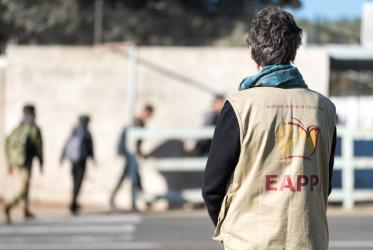These are voices from the communities of Herod’s Gate area in Jerusalem’s Old City; Makhul, and Khirbet Samra in the Jordan Valley—voices of people describing how much the work of the World Council of Churches Ecumenical Accompaniment Programme in Palestine and Israel means to their daily lives.
A group of ecumenical accompaniers—the 87th such group—recently completed their three-month mission, and handed off their volunteer duties to the next group during a ceremony at St George’s Cathedral.
Donald Binder, chaplain to the Anglican Archbishop in Jerusalem, presided over the ceremony. He reflected that the ecumenical accompaniers stand in the tradition of the prophet Micah, who calls upon us all “to do justice, love kindness, and walk humbly with your God.”
Binder asked all to hold the incoming team of ecumenical accompaniers in prayer “so that someday the justice and peace that they seek to encourage will indeed reign in the Land of the Holy One, their mission finally accomplished.”
The outgoing team documented a record number of human rights violations during their time. According to program coordinator Jack Munayer, there were more than twice as many such incidents over the past three months as during a comparable time last fall—679 violations, up from 301.
During the reporting period, 679 human rights violations were documented. Group 86 had reported 492 violations, while Group 85 had reported 301 violations. Since Group 85, the number of reported violations increased by 125%.
During their deployment, Group 87 carried out numerous field visits that included protective presence, monitoring checkpoints, briefings, support for nonviolent action, prayer services, and interventions that ensured a visible active presence.
The accompaniers witnessed many types of human rights violations. For example, three brothers were subjected to violence by Israeli soldiers at Checkpoint 56 in Hebron. One man was arrested, plastic handcuffs were placed around his wrists, and he was taken to the second floor of the checkpoint. While he was there, he heard a shot and later found out that his brother was assaulted with an electric shock weapon and sustained leg injury. Their third brother had a sound grenade thrown near him and consequently sustained a hearing problem.
In another incident, Israeli soldiers on Shuhada Street in Hebron welded the door of a Palestinian home while two children, age 2 and 7, were inside. There were eight soldiers, approximately 15 Palestinians, and one settler gathered outside the home. One Palestinian brought an electric saw and used it to open the welded door. The soldiers entered the home with the women and the children were released. Two more settlers arrived and filmed the incident.
One male settler fired at a Palestinian boy of approximately 12 years old on Al Saraya Street inside Jerusalem’s Old City. The boy sustained an injury on his arm. Armed settlers surrounded the assailant, and the police arrived after approximately 30 minutes. The assailant was not handcuffed while taken to the police station, and there is no information whether or not he was arrested.
The incidents go on—but so do the voices of hope.
“We thank you for your humanity and support to us,” said a man from the Susiya community in Massafer Yatta.
“I am really happy to see you. You are doing great work,” added a lawyer from the Arab Al-Kaabneh Bedouin community in the Jerusalem area.







